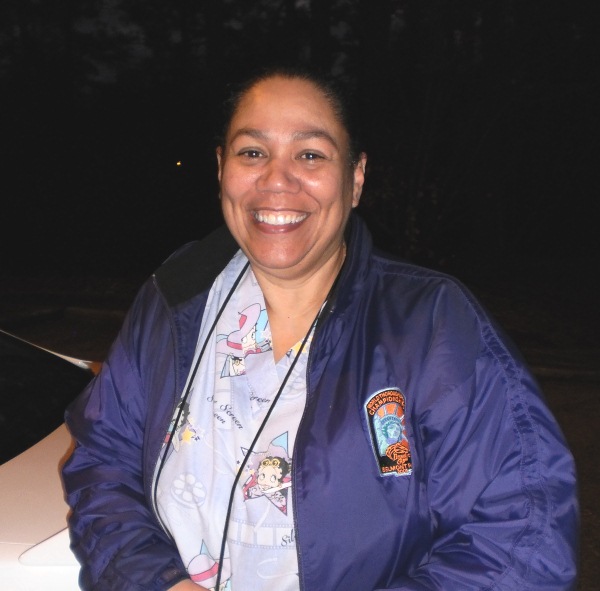During Christmas of 2002 Denise Gonzalez’s husband lavished her with gifts, but she knew something wasn’t right.

Denise Gonzalez
Ultimately, those gifts proved to be a ploy that sucked Denise back into a violent relationship and the worst six months of her life.
“Things just always went downhill around the holiday,” Denise said. “You would just think it would be such a good time — birthdays, Thanksgiving, Christmas — but it wasn’t. It was never a happy time.”
Statistics from the National Resource Center on Domestic Violence suggest that while calls to law enforcement regarding abuse increase around the New Year, calls to domestic violence hotlines drop dramatically.
Sgt. Gregory Darden is the head of the Family Violence Unit at the Raleigh Police Department. He said, “We do see an increase in calls, but we don’t see an actual increase in violence.
However, for Kathy Johnson, associate director of InterAct, a battered woman’s shelter in Raleigh, the phenomenon is real.
“I’ve been working here for 16 years and I’ve been seeing this for a long time,” she said.
Back in Christmas of 2002, Denise wasn’t completely fooled by the nice jewelry. She just wanted to believe the relationship would work.
“The thing is, I don’t even like jewelry. I don’t wear jewelry,” she said “It was just his way of trying to get over on me.”
But she and her ex had a child together, 3-year-old Alexander. Despite previous abuse, she decided to move back in.
The cycle of domestic violence is made up of three steps, Johnson said: “Violent episode, honeymoon, escalation.”
Gift giving, as Denise Gonzalez experienced, is a telltale sign of the honeymoon phase.
“Walking on eggshells” is a common feeling for victims during the escalation phase, Johnson said, and that’s exactly what Gonzalez experienced when she moved back in with her husband. The violence began again quickly.
She experienced verbal, physical and sexual abuse every day.
“Those six months [after Christmas] were really the worst,” Gonzalez said. “It went straight downhill – not like on a slant – it went straight downhill in those six months from January to June.”
The Escape
Fortunately for Denise, she made a friend during those six months.
“She told me, ‘Whatever you need I’m here for you,’” Denise said.
When the day came for Denise and Alexander to leave, it was the friend who drove them. Denise had secretly put Alexander’s birth certificate in her pocketbook a couple of days earlier and left with nothing but the clothes on her back and her son.
After three months of staying in shelters and with close friends, barely showing her face outside, Denise came to InterAct. She’s been inRaleighever since.
And even though she’s living a positive life in a non-abusive environment, the holidays are still hard. Due to her custody arrangement, her husband gets Alexander every other weekend and at Thanksgiving and Christmas.
Gonzalez said it’s a struggle to get her son on the phone during the holiday and even when she does it doesn’t feel like he’s all there.
“It’s almost like he’s afraid to talk when he’s there,” she said.
This holiday anxiety is compounded by the fact Denise doesn’t want to present her ex in a bad light to Alex.
Even when the abuse was ongoing Denise said she would say things like, “We have to be ready in case the bad people show up,” rather than tell her son they were hiding out from his father or “Well, you know daddy was mean to me,” to which her son always replied “Well, he wasn’t mean to me.”
“Even though he was a monster to me, he wasn’t a monster to his kid,” Denise said.
Holding it Together for the Holidays
“People try to hold it together for their families during the holidays,” Johnson said.
And it’s this added pressure that eventually blows up in their faces.
“Alcohol or the holidays don’t make a situation violent,” Johnson added. “They just escalate an already violent situation.”
Johnson says the biggest time for domestic violence besides after Christmas is after the school year ends. It’s another time when people hold it together for their families.
Sgt. Darden of the Raleigh Police said “verbal abuse increases more” after the holidays. However, he adds that’s not something that usually leads to official charges.
Darden said even if call outs don’t lead to charges, his officers always follow up and offer ways to help, which can include counseling, restraining orders and other methods.
But even with resources available, Gonzalez believes that right now it’s harder for women to leave than ever.
“In this economy right now,” Gonzalez said, “I’m sure there are a lot of women that are being abused right now that feel like, ‘Oh my gosh! If he can’t get a job, I can’t get a job. How will we ever make it?! I guess I’m stuck.’”
“It can’t be that way,” she said. “I’d rather be stuck out there with no job and just make ends meet rather than live in [an abusive] situation.”
Denise is finding it hard to make ends meet these days. She works three jobs; one full-time at the DMV and two part-time. But she’s happy with it.
“I’m struggling right now, but at least I’m at home.” Denise said. “I’m not arguing with him. There’s no abuse here.”
